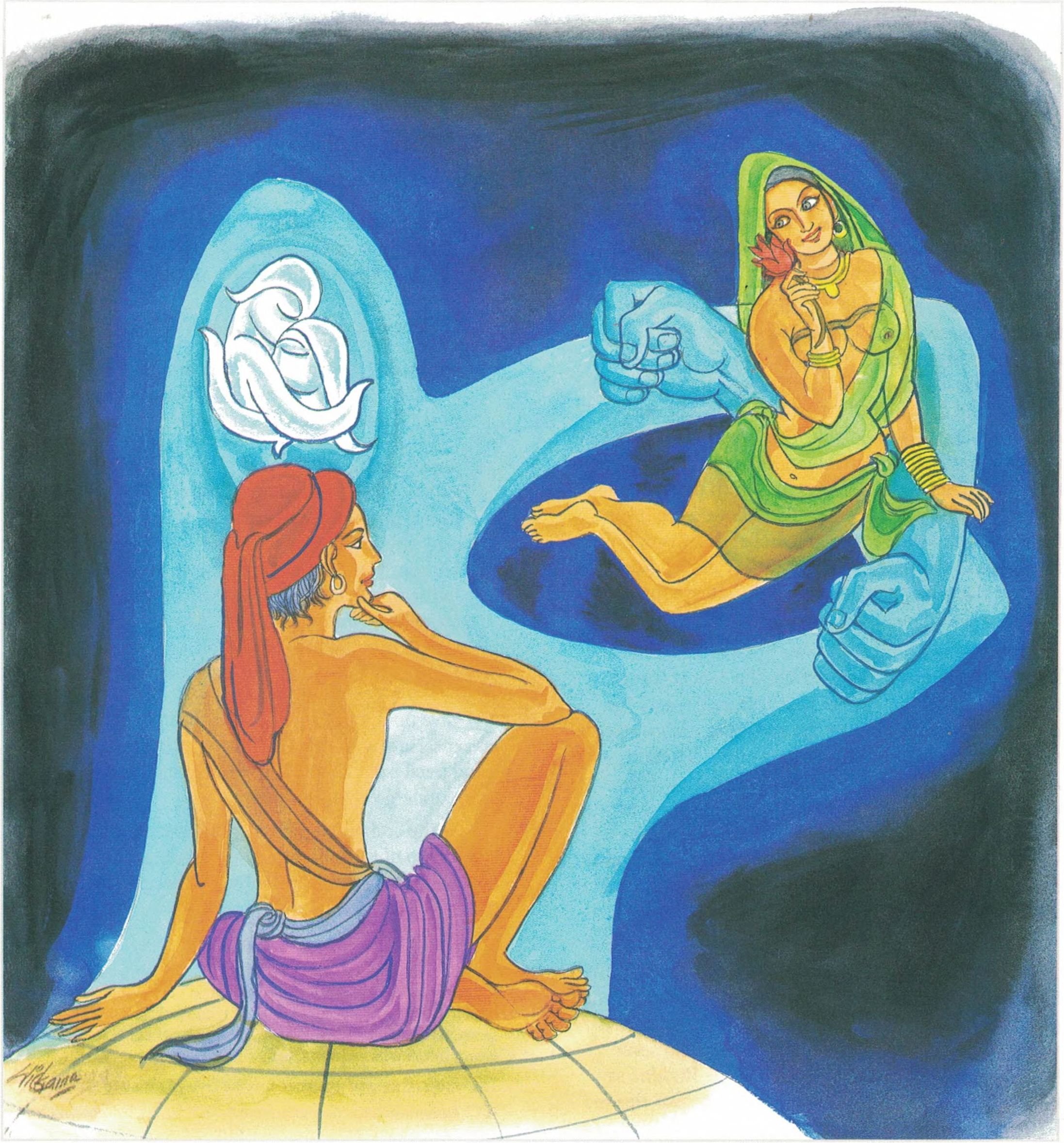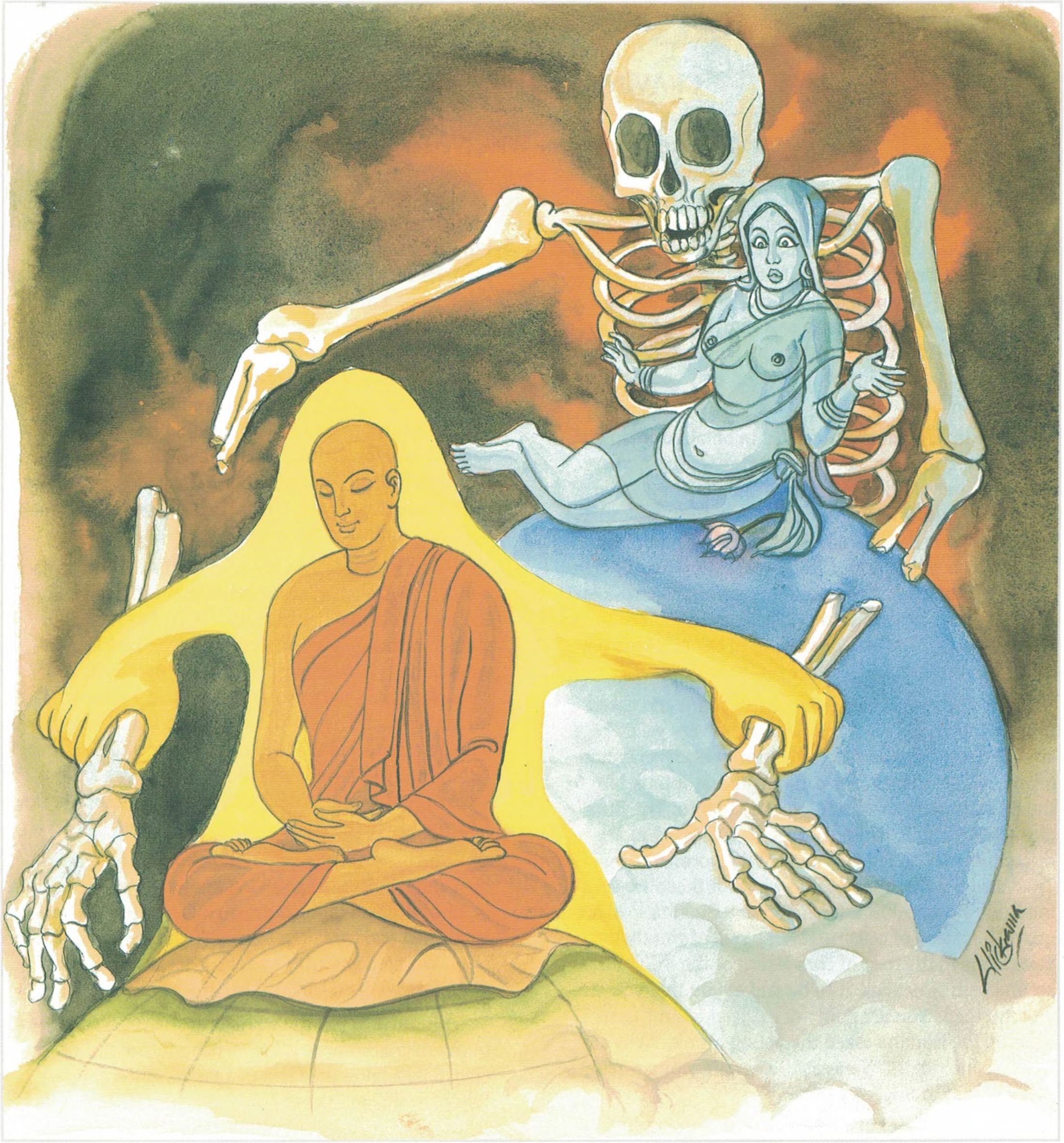Dhammapada (Illustrated)
by Ven. Weagoda Sarada Maha Thero | 1993 | 341,201 words | ISBN-10: 9810049382 | ISBN-13: 9789810049386
This page describes Young Archer the Wise which is verse 349-350 of the English translation of the Dhammapada which forms a part of the Sutta Pitaka of the Buddhist canon of literature. Presenting the fundamental basics of the Buddhist way of life, the Dhammapada is a collection of 423 stanzas. This verse 349-350 is part of the Taṇhā Vagga (Craving) and the moral of the story is “With lust intense, on beauty dwelling, crushed by one’s thoughts, craving productively grows” (first part only).
Verse 349-350 - Young Archer the Wise
Pali text, illustration and English translation of Dhammapada verse 349-350:
vitakkapamathitassa jantuno tibbarāgassa subhānupassino |
bhiyyo taṇhā pavaḍḍhati esa kho daḷhaṃ karoti bandhanaṃ || 349 ||
vitakkupasame ca yo rato asubhaṃ bhāvayati sadā sato |
esa kho vyantikāhiti esa checchati mārabandhanaṃ || 350 ||
349. For one who’s crushed by thinking much excessive lust from beauty’s sight, for that one craving grows the more, that one makes strong the bonds.
350. But who delights in calming thoughts develops foulness mindfully, that one indeed will make an End, will sever Mara’s bonds.
 With lust intense, on beauty dwelling, crushed by one’s thoughts, craving productively grows. |
 To chop off Mara’s bonds one must dwell on unwholesomeness and guard one’s thoughts. |
Young Archer the Wise
The story goes that once upon a time a young monk took the ticket that fell to him, obtained ticket-porridge, went to the assembly hall, but finding no water there, went to a certain house for the purpose of obtaining water. There a young woman saw him, and no sooner saw him than fell in love with him. “Venerable,” said she, “should you again require water, pray come right here;go nowhere else.”
After that, whenever he failed to obtain drinking water, he went to her house and never went anywhere else. And she would take his bowl and give him water for drinking. As time went on, she gave him rice-gruel also. Again one day she provided a seat for him right there and gave him boiled rice. And seating herself near him, she started up a conversation, saying, “Venerable, it is very lonely indeed in this house; we never see so much as a traveler.” After listening to her talk for a few days, the young monk became discontented.
One day some visiting monks saw him and asked him, “Brother, why is it that you are so very yellow?” “I am discontented.” So they took him to his teacher and his preceptor. His teacher and his preceptor took him to the Buddha and reported the matter to him. The Buddha asked, “Monk, is the statement true that you are discontented?” “It is true,” replied the young monk. Then said the Buddha, “Monk, why is it that after retiring from the world in the religion of a Buddha so vigorous as I, instead of causing it to be said of you that you have attained the fruit of conversion or the fruit of the second path, you allow it to be said of you that you are discontented? You are guilty of a grievous sin.” Continuing, the Buddha asked the young monk, “Why are you discontented?” “Venerable, a certain woman said this and that to me.”
“Monk, it is not at all strange that she should do such a thing as this. For in a previous state of existence, she had forsaken Dhanuggaha, the wisest man in all India, and conceiving a passion for a certain bandit on the spur of the moment, slew her husband.” The monks asked the Buddha to make the matter clear, and in compliance with their request, he related the following:
Story of the Past: Young Archer the Wise
In times past there lived a certain wise man named Young Archer the Wise, Culla Dhanuggaha. He acquired the arts and crafts at Takkasilā under a world-renowned teacher. His teacher was so pleased with the progress he made that he gave him his daughter in marriage. Young Archer the Wise took his wife and set out for Benāres. At the entrance to the forest he slew fifty bandits with fifty arrows. When his arrows were all gone, he seized the leader of the bandits and hurled him to the ground. “Wife, bring me my sword!” cried he. But the moment his wife saw that bandit, she conceived a passion for him, and placed the hilt of the sword in the hand of the bandit. The bandit straightway slew Young Archer the Wise. Then he took the woman with him and went his way.
As he proceeded on his way, he thought to himself, “Should this woman see another man, she will kill me too just as she did her husband. What use have I for such a woman?” Seeing a certain river, he left the woman on the near bank, took her ornaments, and said, “Remain where you are until I carry your ornaments across.” Then and there he left her. When the woman discovered that the bandit had left her, she said, “Brāhmin, you have taken all my ornaments and crossed to the other side. Return speedily, quickly; now take me too to the other side.”
The bandit replied, “Woman, you have bartered a husband whom you have long known for me, a husband whom you know not; you have bartered a husband tried and true for a husband whom you have not tried. Woman, you may barter me for another man. Therefore I will go far from hence.”
[In order to put the woman to shame, Sakka goes to the river accompanied by his charioteer and his musician. Sākka takes the form of a jackal, the charioteer that of a fish, and the musician that of a bird. The jackal takes a piece of meat in his mouth and stands in front of the woman. The fish leaps out of the water, and the jackal springs forward to catch the fish, dropping the piece of meat. The bird seizes the piece of meat and flies up into the air. The fish disappears in the water. Thus the jackal loses both fish and flesh. The woman laughs loudly.
[The jackal says:]
Who is this that laughs loud in the cassia thicket? Here is no dancing or singing, or well-timed clapping of hands.
It is a time to weep, Shapely-Buttocks. Why pray do you laugh, fair one?
[The woman replies:]
Foolish, stupid jackal, little wisdom do you possess, jackal.
You have lost both fish and flesh; you mourn like a pauper.
[The jackal says:]
Easy to see are the faults of others, but hard to see are one’s own.
You have lost both husband and lover. You too mourn, I doubt not.
[The woman says:]
So it is as you say, jackal, king of beasts.
Therefore I will go hence and submit to the will of a husband.
[The jackal says:]
He that will steal a vessel of clay, will also steal a vessel of copper.
You have done evil once, and will also do so again.
When the Buddha had related at length this Culla Dhanuggaha Jātaka, found in the fifth Nipāta, he said, “At that time you were Young Archer the Wise, the woman was this maiden here, and the king of the gods who came in the form of a jackal and put her to shame, was I myself. Even thus did this woman fall in love with a certain bandit at first sight and deprive of life the wisest man in all India. Monk, uproot and destroy the desire which has sprung up within you for this woman.” Having thus admonished the monk, he expounded the Dhamma further, reciting the stanzas.
Explanatory Translation (Verse 349)
vitakkapamathitassa tibbarāgassa subhānupassino jantuno
bhiyyo tanhā pavaḍḍhati, esa kho bandhanaṃ daḷhaṃ karoti
vitakkapamathitassa: those assailed by doubts and suspicions; tibbarāgassa: with keen passions; subhānupassino [subhānupassina]: taking the sensual pleasures as good; jantuno [jantuna]: in them; bhiyyo [bhiyya]: greatly; pavaḍḍhati: increases; esa kho: this; bandhanaṃ [bandhana]: the grip of bonds; daḷhaṃ karoti: makes stronger
In those whose minds are agitated and assailed by doubts and suspicions, whose passions and sensualities are sharpened, craving increases more and more. This makes the bonds tighter.
Explanatory Translation (Verse 350)
yo vitakkūpasame rato ca sadā sato asubham bhāvayati
esa kho vyantikāhiti esa Mārabandhanaṃ checchati
yo: if someone; vitakkūpasame: in the eradication of doubts and suspicions; rato: is engaged; sadā: always; sato: mindful; asubham: the evil of the world of reality; bhāvayati: contemplates; esa kho: that person; vyantikāhiti: will eradicate craving; mārabandhanaṃ [mārabandhana]: the bonds of Māra; checchati: will cut off
He who is constantly engaged in dispelling the doubts and suspicions that assail the mind, is earnest and ever alert, looks on the world of reality as not pleasant. He will eradicate craving and will cut off the bonds of death.
